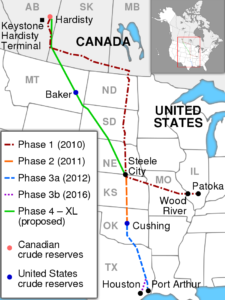 The Canadian promoter of the Keystone XL pipeline is giving up on the project after the Biden administration revoked the permits issued under Trump. Read story here.
The Canadian promoter of the Keystone XL pipeline is giving up on the project after the Biden administration revoked the permits issued under Trump. Read story here.
The pipeline would have connected Alberta’s tar sands fields to the Cushing, Oklahoma, oil hub and refineries in Illinois and Texas (see map).
The project became a rallying point for climate activists opposed to fossil fuel expansion, but the proposed pipeline also galvanized environmentalists worried about specific environmental threats such as the pipeline crossing a sensitive aquifer in Nebraska. Read more about the pipeline’s environmental issues here.
The pipeline also raised other issues, including indigenous rights and eminent domain; there also were disputes about how many jobs the project would create, and accusations that none of the oil was destined for domestic use, but would only be exported to China and other countries. Read about those issues here.
During the 1980s oil shortages, Ralph Nader said, “The world is awash in oil.” He turned out to be right. When oil shortages have occurred, they’re resulted from deliberate manipulation of oil markets, not a lack of oil in the ground. Exxon is finding billions of barrels offshore of Guyana, there are large subsea deposits off Brazil’s coast, and the mostly undeveloped Canadian and Venezuelan oil sands dwarf the Persian Gulf oilfields. This planet holds far more oil than has been burned to date. It’s a very common substance.
There’s no market shortage now, either. Global oil markets have been oversupplied since 2014, resulting in crashing oil prices, oil piling up in storage, and an oil industry recession. The shale revolution transformed the U.S. from an oil importer to an oil exporter. Against this landscape, it’s hard to see any need to bring Canadian tar sands oil to the U.S., and that’s hard to justify in light of the environmental and other concerns.
Climate activists want to put the oil industry out of business. Market forces are going to do it for them. Fossil fuels are on the way out. Electric vehicles are going mainstream, and while wind and solar electrical generation are still in early stages of development, solar costs have come down enough to make solar cost-competitive. The phaseout of oil will be gradual, but peak oil demand can’t be far away, and in light of that, investing billions in building more oil infrastructure doesn’t seem to make a lot of economic sense.
Putting oil out of business is a very big lift. Just think of all the plastics. Think of fertilizer. Think of all the ships on the high seas,,,,cargo ships are not going nuclear.
Short of governments outlawing the combustion engine it will not be going away. We are far away from electric vehicle synchronicity. Not everyone has a place for an electric vehicle. You need not just a parking space but also a power outlet. There isn’t enough lithium to build batteries for all those vehicles. And there is not enough power generation for Americas transportation fleet to go all electric.
Canada’s oil and oil is going to get to market. Petroleum will remain a product that delivers energy in a simple small transportable package, that works in the dark, in the cold, in the rain, in extreme heat.
There won’t be any need for oil at all after this planet gets rid of its humans.